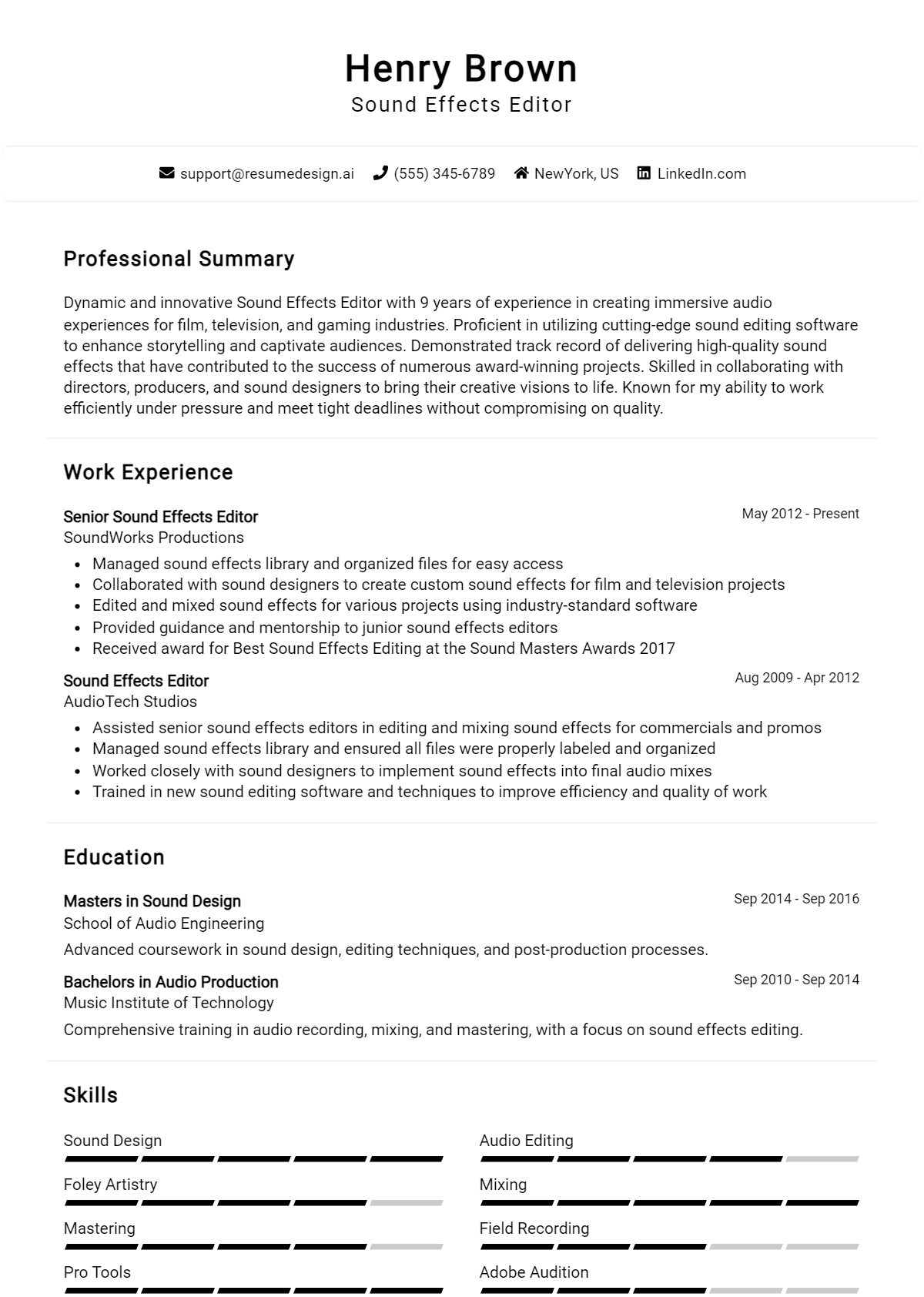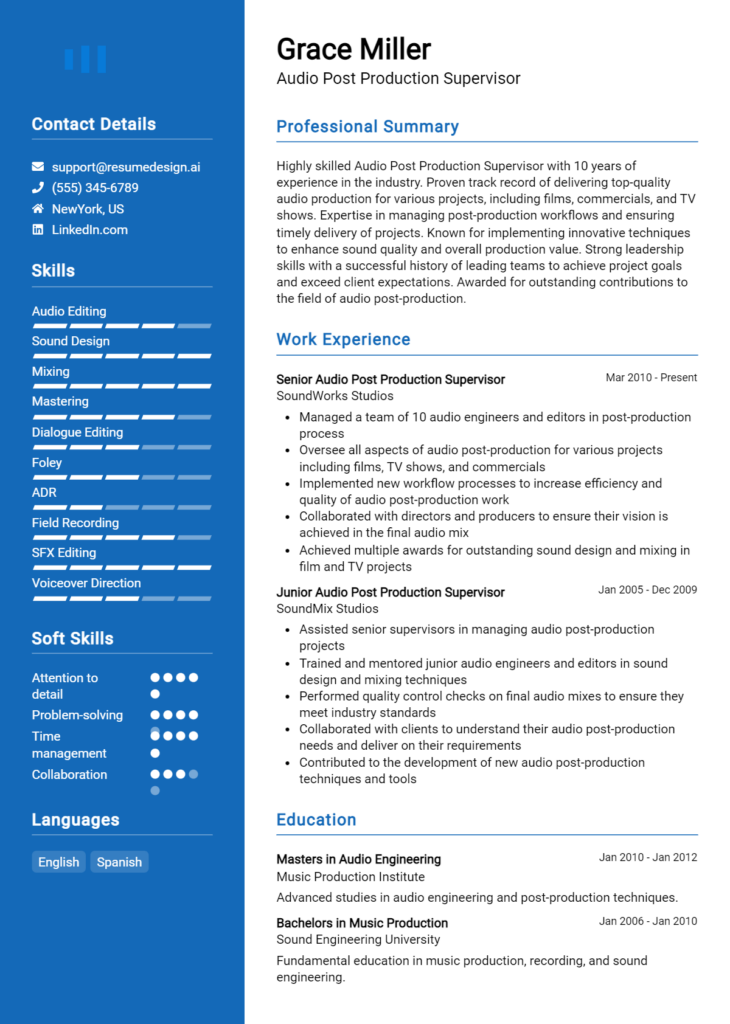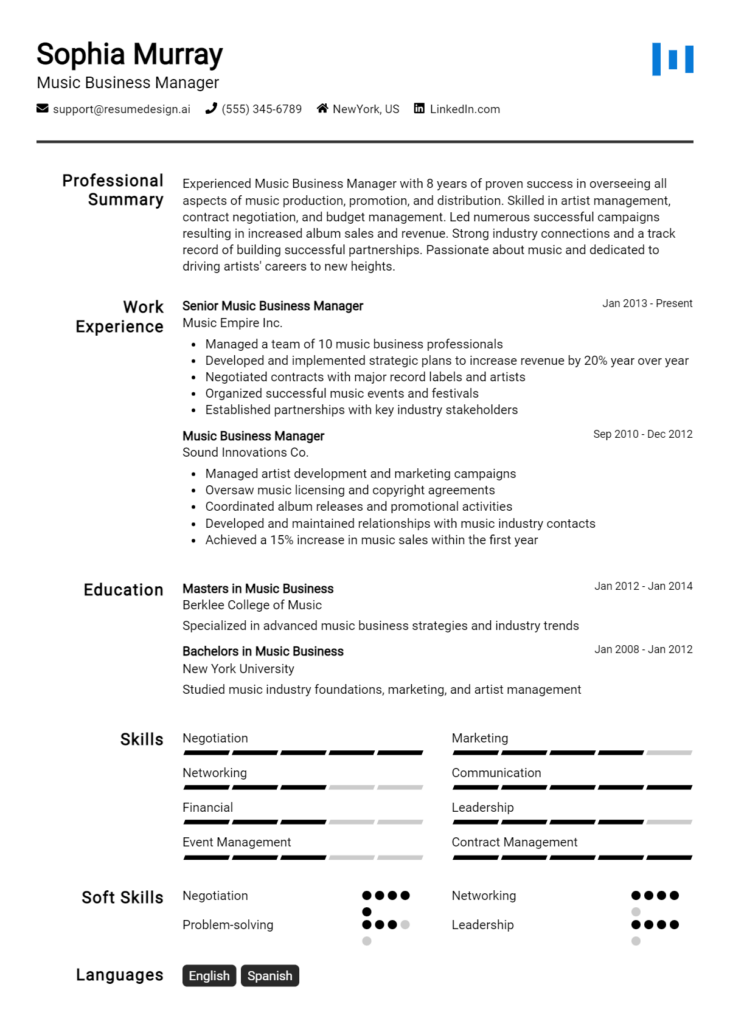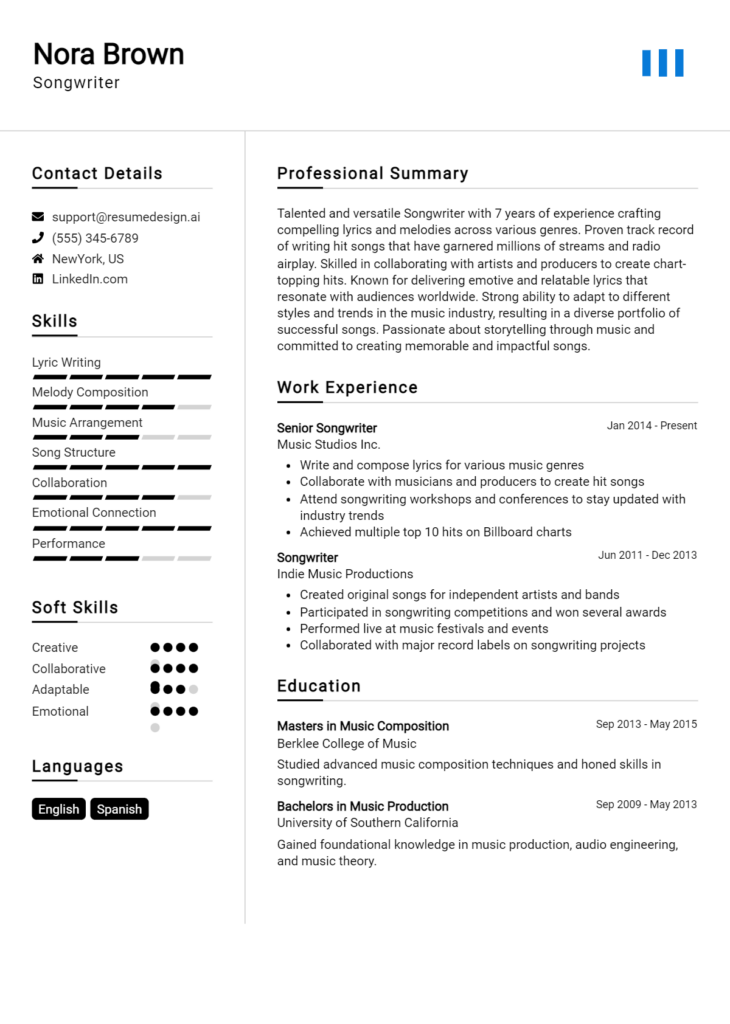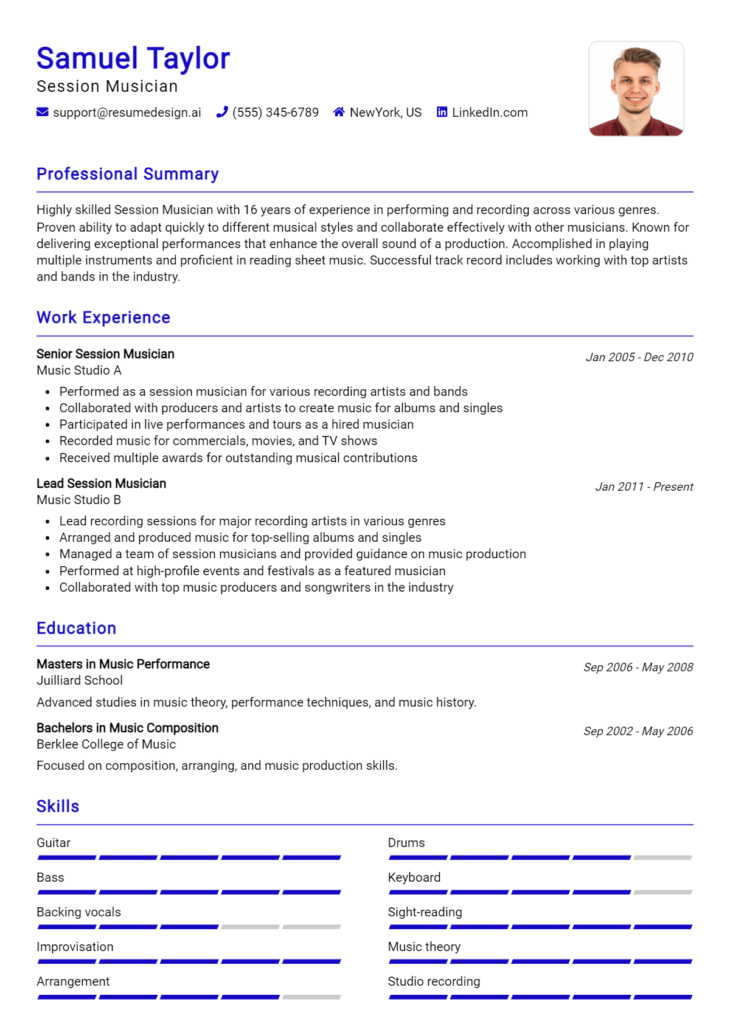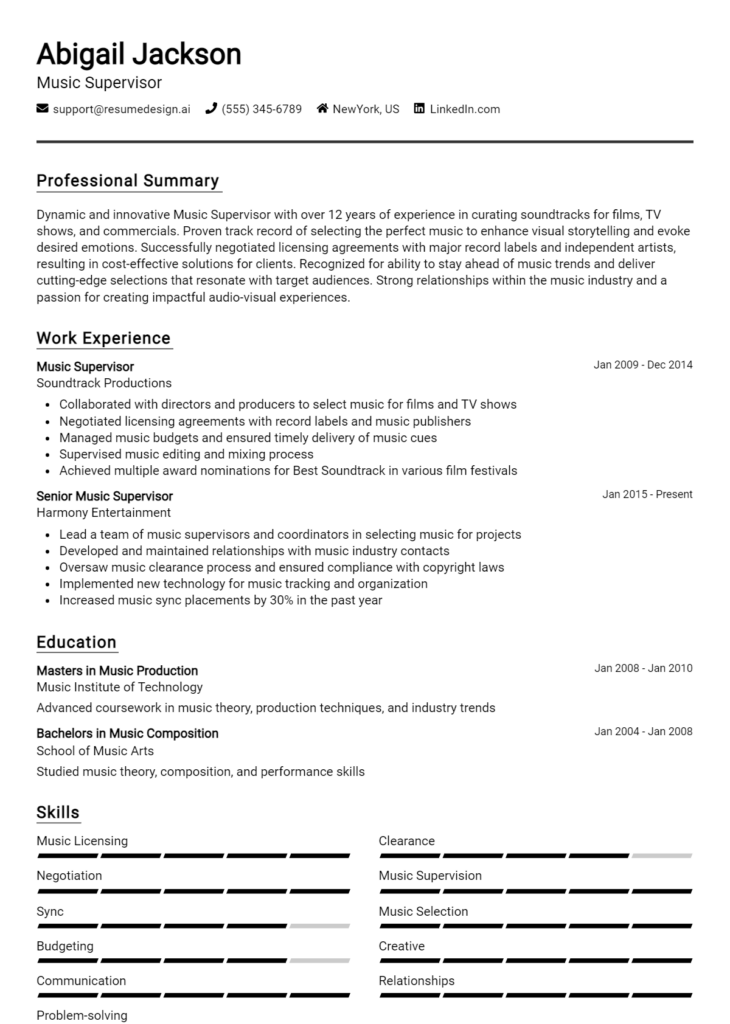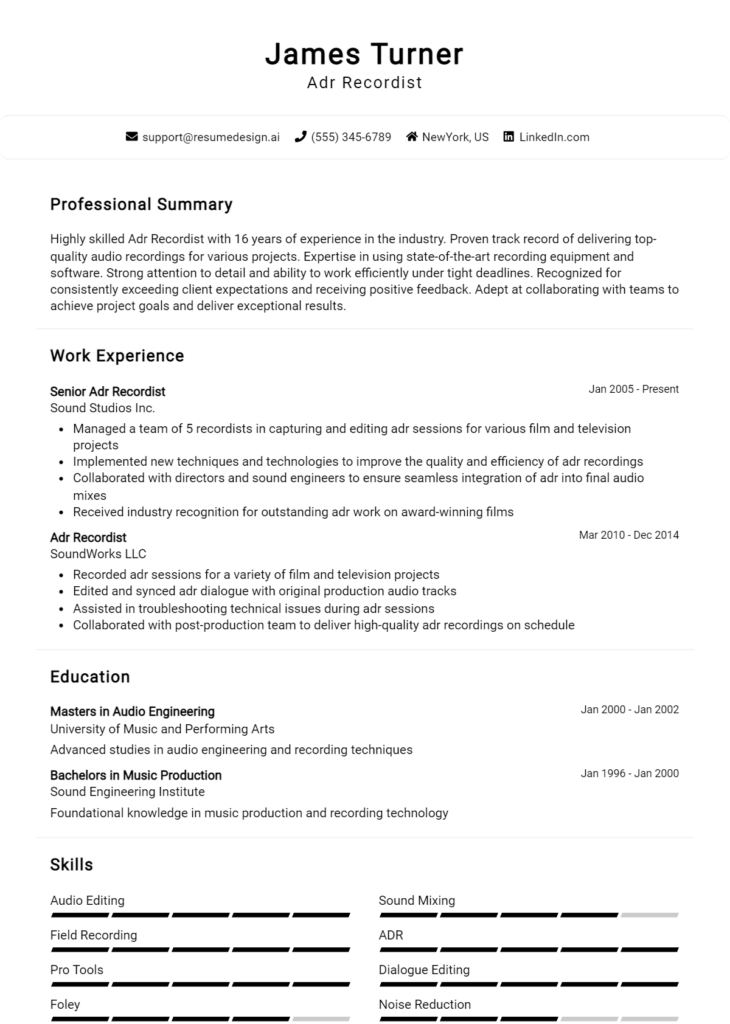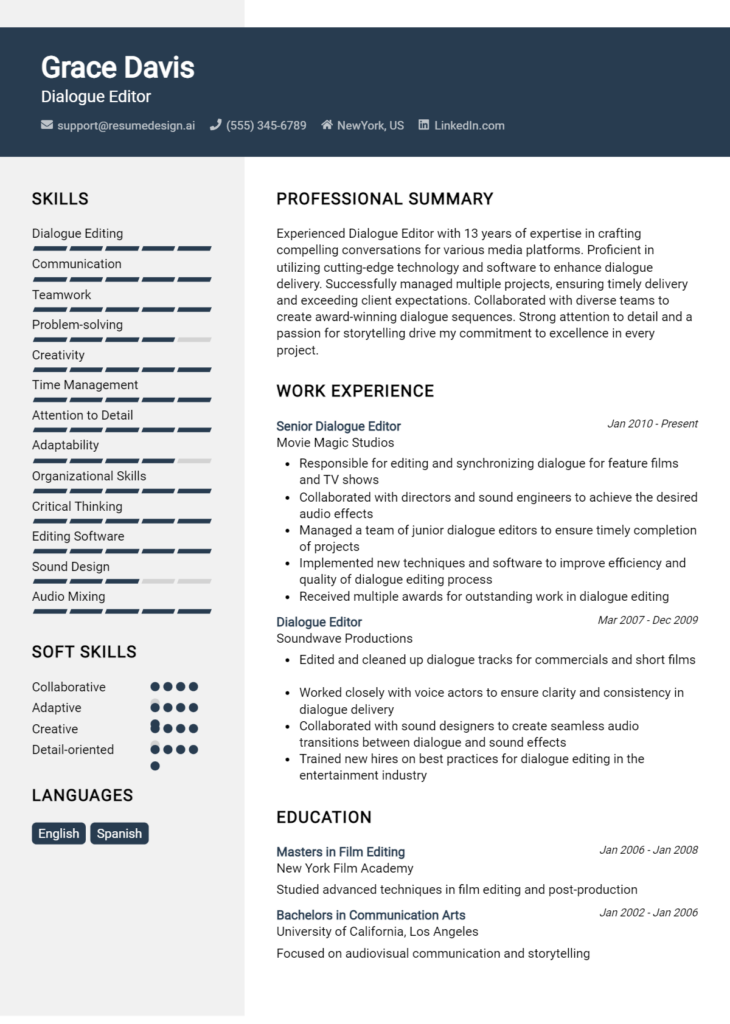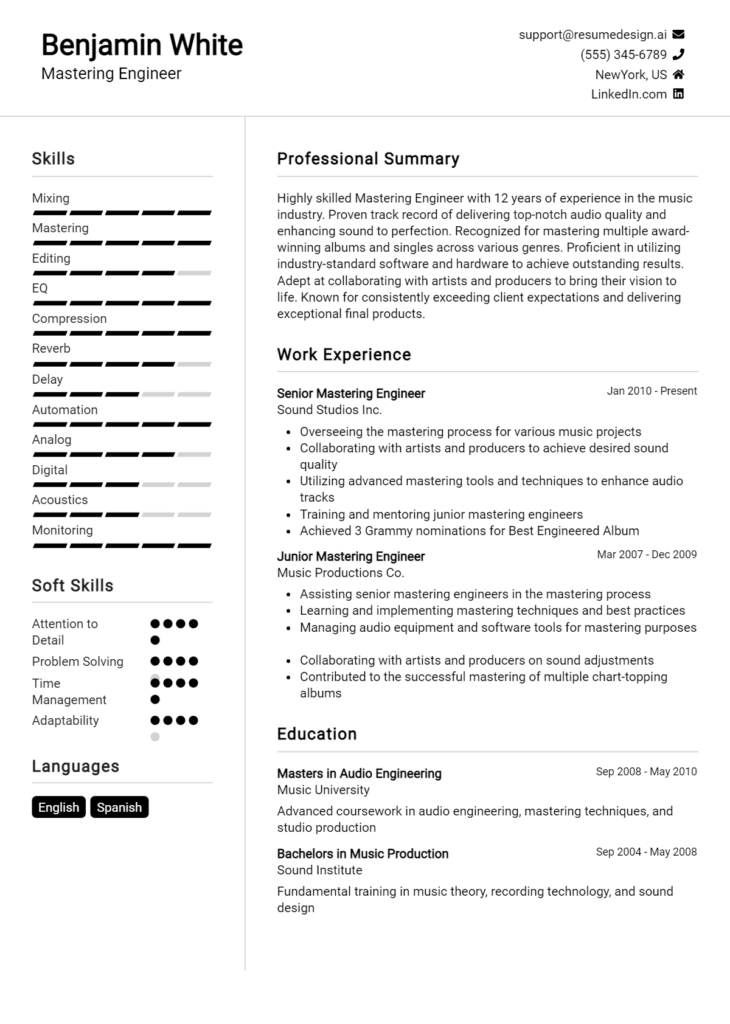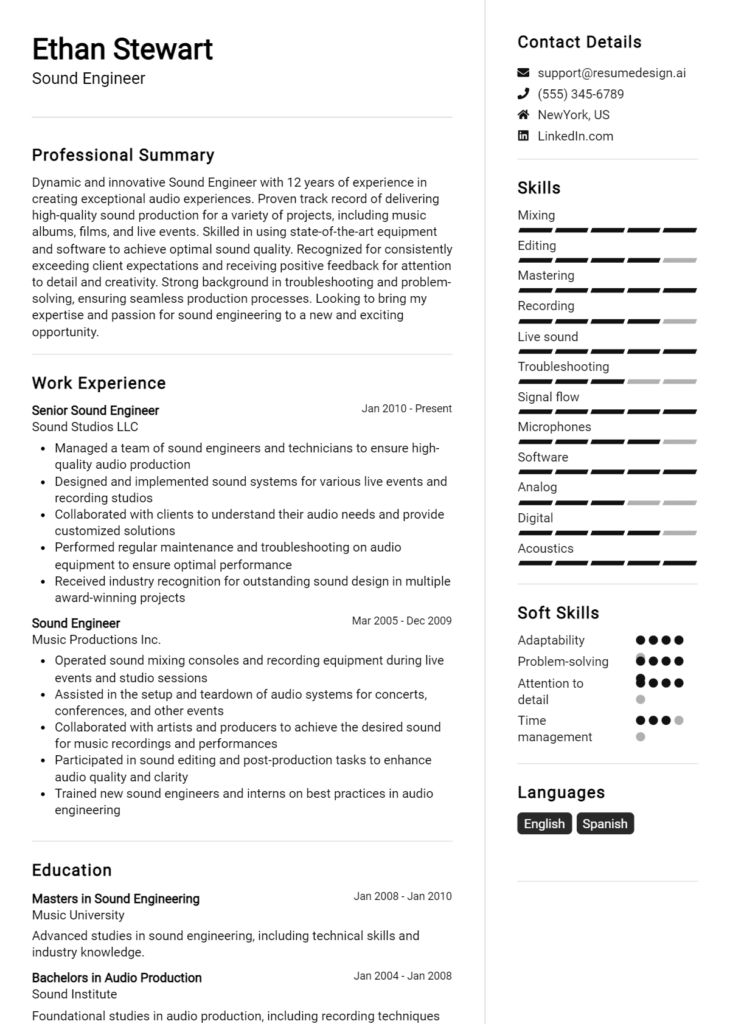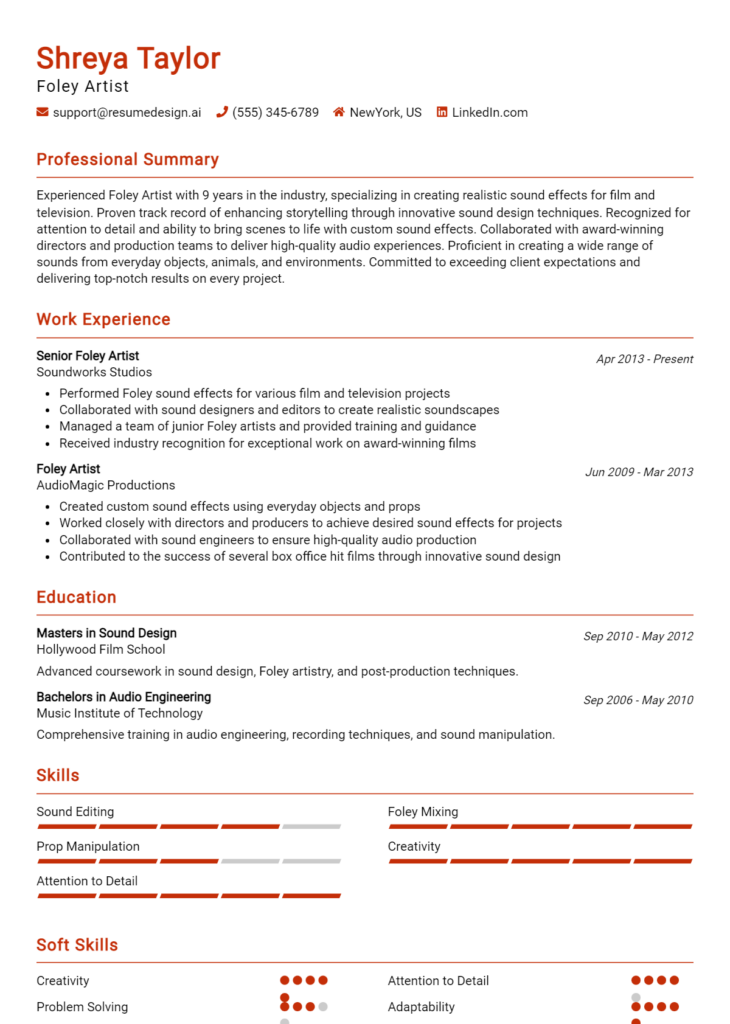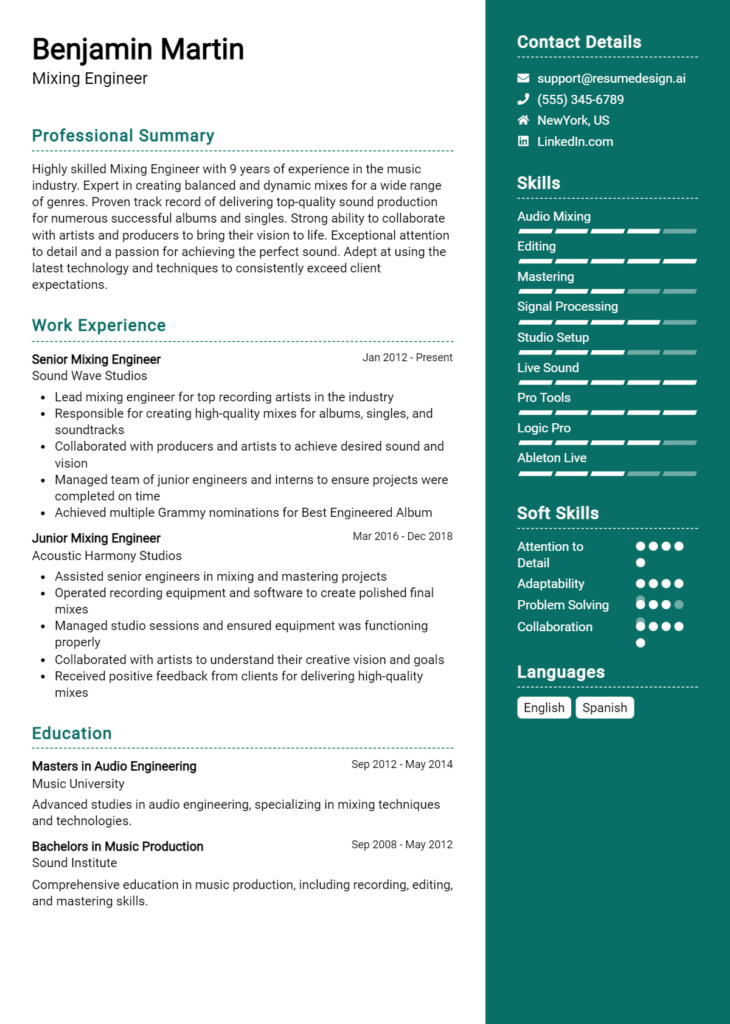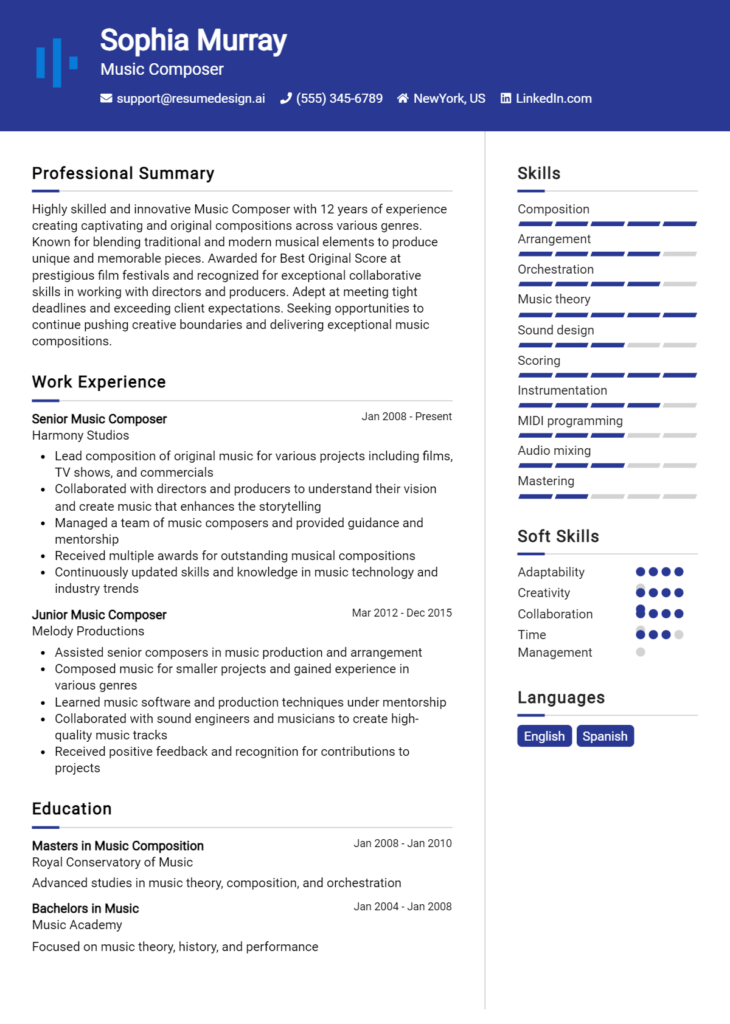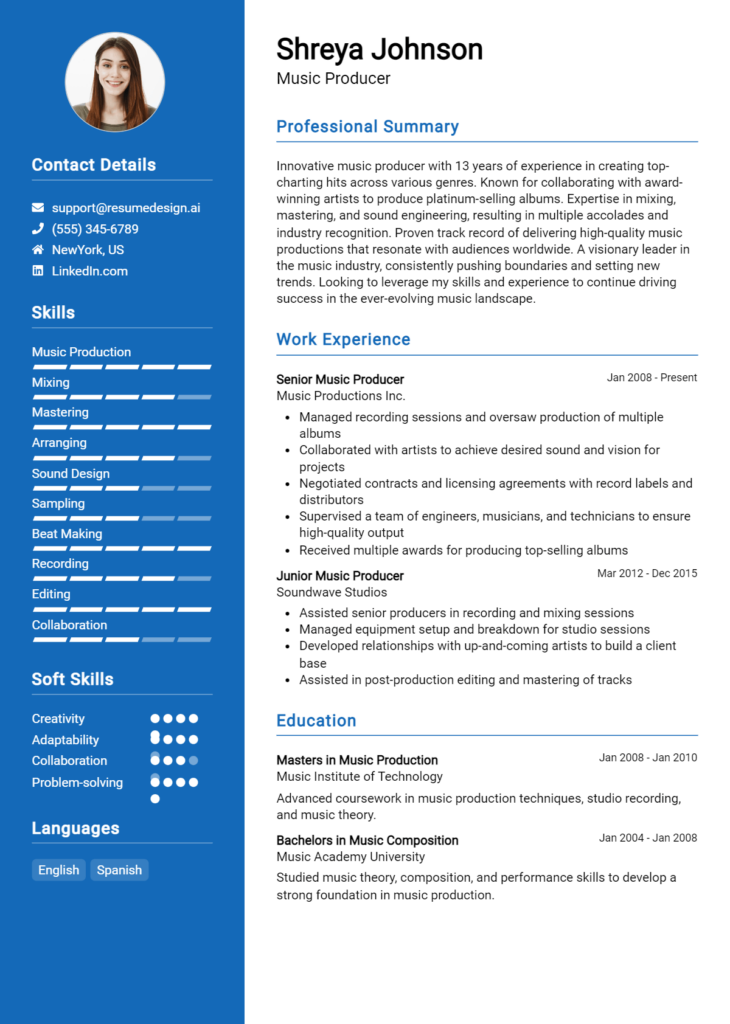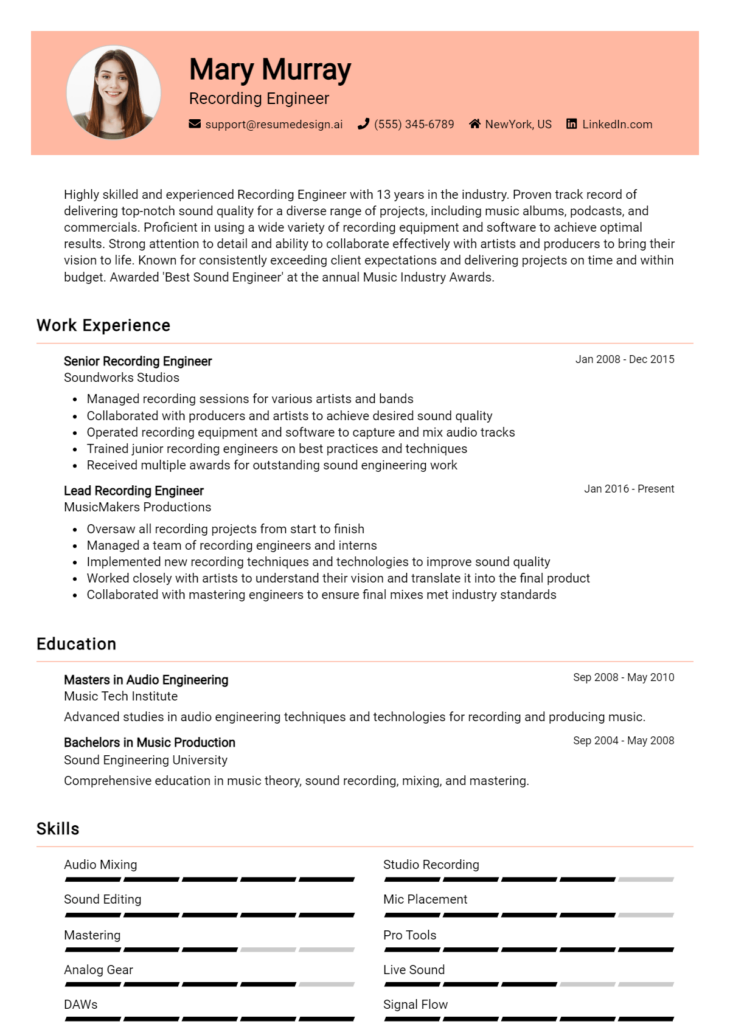Sound Effects Editor Core Responsibilities
A Sound Effects Editor plays a crucial role in the post-production process, ensuring that audio elements enhance the visual storytelling experience. Key responsibilities include recording, editing, and mixing sound effects while collaborating closely with directors, sound designers, and other production staff. Essential skills encompass technical proficiency in audio software, strong operational insight, and adept problem-solving abilities. These competencies are vital for meeting project goals and deadlines. A well-structured resume effectively showcases these qualifications, making candidates stand out in a competitive field.
Common Responsibilities Listed on Sound Effects Editor Resume
- Design and create original sound effects tailored to the project.
- Edit, mix, and enhance existing audio tracks for clarity and impact.
- Collaborate with directors and sound designers to achieve the desired auditory vision.
- Manage sound libraries and maintain organized audio files.
- Conduct field recordings, capturing high-quality sound effects on location.
- Utilize audio editing software to manipulate and refine sound elements.
- Ensure sound effects sync seamlessly with visual elements.
- Implement feedback from directors and producers to meet project requirements.
- Maintain project timelines and deliver audio files on schedule.
- Stay updated with industry trends and technological advancements in sound editing.
- Troubleshoot technical issues related to audio equipment and software.
High-Level Resume Tips for Sound Effects Editor Professionals
In the competitive world of sound design, a well-crafted resume is crucial for Sound Effects Editor professionals seeking to make their mark in the industry. Your resume is often the first impression you make on potential employers, serving as a vital tool to showcase your skills, experience, and achievements. It needs to not only capture the essence of your technical abilities but also reflect your creativity and passion for sound editing. This guide aims to provide practical and actionable resume tips specifically tailored for Sound Effects Editor professionals, helping you stand out in a crowded job market.
Top Resume Tips for Sound Effects Editor Professionals
- Tailor your resume to the specific job description, emphasizing relevant skills and experiences that match the employer's needs.
- Highlight your technical proficiency with industry-standard software and tools like Pro Tools, Adobe Audition, and Logic Pro.
- Showcase relevant experience in film, television, video games, or other media projects that demonstrate your expertise in sound editing.
- Quantify your achievements by including metrics, such as the number of projects completed, awards won, or audience engagement levels achieved through your sound work.
- Include a strong portfolio link that showcases your best sound editing projects, providing potential employers with a direct demonstration of your skills.
- Emphasize your ability to collaborate with directors, producers, and other team members, highlighting your communication and teamwork skills.
- List relevant certifications or training that enhance your qualifications, such as audio engineering courses or sound design workshops.
- Use action verbs to describe your roles and responsibilities, making your contributions sound dynamic and impactful.
- Keep your resume concise and focused, ideally one page, to ensure it is easy to read and digest.
By implementing these tips, you can significantly increase your chances of landing a job in the Sound Effects Editor field. A well-structured and tailored resume not only highlights your skills and achievements but also demonstrates your professionalism and commitment to the craft, setting you on the path to success in an exciting and evolving industry.
Why Resume Headlines & Titles are Important for Sound Effects Editor
In the competitive field of sound design, a Sound Effects Editor plays a crucial role in enhancing audio experiences by creating, editing, and integrating sound effects that elevate visual storytelling. When it comes to applying for positions in this niche industry, the importance of resume headlines and titles cannot be overstated. A strong headline or title serves as the first impression for hiring managers, immediately grabbing their attention and summarizing a candidate's key qualifications in a concise, impactful phrase. It should be relevant to the job being applied for, effectively communicating the candidate's expertise and fit for the role.
Best Practices for Crafting Resume Headlines for Sound Effects Editor
- Keep it concise: Aim for a headline that is no longer than 10-12 words.
- Be role-specific: Tailor the headline to reflect the specific Sound Effects Editor position you are applying for.
- Highlight key skills: Incorporate relevant skills that showcase your expertise in sound editing and design.
- Use industry terminology: Utilize terms and phrases that are familiar in the audio production industry.
- Focus on achievements: If possible, include notable accomplishments or experiences that set you apart.
- Be clear and direct: Avoid vague language; your headline should convey exactly what you bring to the table.
- Consider your audience: Think about what potential employers are looking for and tailor your headline accordingly.
- Revise and refine: Don’t hesitate to revisit and revise your headline for clarity and impact.
Example Resume Headlines for Sound Effects Editor
Strong Resume Headlines
Dynamic Sound Effects Editor with 8+ Years in Film & Television
Award-Winning Audio Designer Specializing in Immersive Soundscapes
Creative Sound Effects Specialist with Expertise in Foley and ADR
Experienced Sound Editor Committed to Enhancing Narrative Through Audio
Weak Resume Headlines
Just Another Sound Editor
Looking for Jobs in Audio
Sound Effects and Other Stuff
The strong headlines are effective because they provide a clear and compelling snapshot of the candidate's qualifications and unique strengths, making it easy for hiring managers to see their potential fit for the role. In contrast, the weak headlines fail to impress due to their vague language and lack of specificity, which can lead to a lack of interest from employers looking for qualified candidates. A well-crafted headline can make all the difference in standing out in a crowded job market.
Writing an Exceptional Sound Effects Editor Resume Summary
A well-crafted resume summary is a vital element for a Sound Effects Editor as it serves as the first impression for hiring managers. This brief yet powerful statement encapsulates the candidate's key skills, relevant experience, and notable accomplishments, allowing them to quickly assess the applicant's suitability for the role. A strong summary should be concise, impactful, and tailored specifically to the job description, effectively capturing attention and setting the tone for the rest of the resume.
Best Practices for Writing a Sound Effects Editor Resume Summary
- Quantify Achievements: Include specific metrics or results to demonstrate the impact of your work.
- Focus on Relevant Skills: Highlight technical skills, software proficiency, and creative abilities pertinent to sound editing.
- Tailor to the Job Description: Customize the summary for each position by incorporating keywords and phrases from the job posting.
- Use Action Verbs: Start sentences with strong action verbs to convey a sense of proactivity and accomplishment.
- Keep It Concise: Aim for 3-5 sentences that deliver maximum information without being overly verbose.
- Showcase Industry Experience: Mention years of experience and notable projects or clients to establish credibility.
- Highlight Collaborative Skills: Emphasize teamwork, communication, and problem-solving abilities in collaborative settings.
- Reflect Passion for Sound Design: Convey enthusiasm for sound editing and a commitment to creating high-quality audio experiences.
Example Sound Effects Editor Resume Summaries
Strong Resume Summaries
Dynamic Sound Effects Editor with over 6 years of experience in film and television, specializing in creating immersive audio landscapes. Successfully enhanced sound quality for over 20 feature films, contributing to a 15% increase in audience engagement ratings.
Detail-oriented Sound Effects Editor skilled in Pro Tools and Adobe Audition, with a proven track record of delivering high-quality sound design under tight deadlines. Collaborated with a team on a documentary that won the Best Sound Award at the 2022 International Film Festival.
Creative Sound Effects Editor with a passion for storytelling through sound, possessing expertise in foley artistry and field recording. Achieved a 30% improvement in sound clarity for a major streaming platform’s original series, resulting in positive critical acclaim.
Weak Resume Summaries
Experienced sound editor with skills in various software and a general background in editing sounds for projects.
Sound Effects Editor looking for opportunities to work on different projects and utilize skills in sound design.
The strong examples are effective because they are specific, quantifiable, and directly related to the job, showcasing the candidate's skills and accomplishments in a clear manner. In contrast, the weak summaries lack detail and measurable outcomes, making them too vague and generic, which fails to capture the interest of hiring managers.
Work Experience Section for Sound Effects Editor Resume
The work experience section of a Sound Effects Editor resume is critical as it serves as the primary showcase for a candidate's technical skills and professional history. This section not only highlights the candidate's proficiency with sound design software and sound editing techniques but also demonstrates their ability to manage teams and deliver high-quality audio products within tight deadlines. By quantifying achievements, such as the number of projects completed or improvements in sound quality, and aligning experiences with industry standards, candidates can effectively communicate their expertise and value to potential employers.
Best Practices for Sound Effects Editor Work Experience
- Highlight specific sound editing software and tools utilized in projects.
- Include quantifiable results, such as percentage improvements or awards received.
- Detail collaborative efforts with directors, producers, and other sound team members.
- Showcase leadership roles in managing projects or mentoring junior team members.
- Emphasize versatility by mentioning work across various genres or platforms.
- Present clear before-and-after comparisons to illustrate impact on audio quality.
- Utilize industry-specific terminology to demonstrate familiarity with sound design concepts.
- Tailor experiences to align with the specific requirements of the job being applied for.
Example Work Experiences for Sound Effects Editor
Strong Experiences
- Led a team of sound editors in a feature film project, resulting in a 30% increase in overall audio quality as measured by audience feedback.
- Implemented a new sound design workflow that reduced project turnaround time by 25%, allowing for faster delivery of high-quality sound effects.
- Collaborated with the visual effects team to synchronize sound and visuals for a major video game title, receiving a BAFTA nomination for Best Audio.
- Produced and mixed over 50 commercial advertisements, achieving a 40% increase in client satisfaction ratings based on post-project surveys.
Weak Experiences
- Worked on various audio projects.
- Assisted in editing sound for a few films.
- Helped the team with sound design tasks.
- Participated in many meetings about audio production.
The examples provided highlight the difference between strong and weak experiences in a Sound Effects Editor resume. Strong experiences are characterized by specific achievements, quantifiable results, and clear collaboration efforts, which demonstrate a candidate's impact and leadership in their field. In contrast, weak experiences lack detail and measurable outcomes, making it difficult for potential employers to gauge the candidate's true capabilities and contributions to past projects.
Education and Certifications Section for Sound Effects Editor Resume
The education and certifications section of a Sound Effects Editor resume plays a crucial role in establishing the candidate's qualifications and expertise in the field. This section not only showcases the academic background that provides foundational knowledge in sound design and editing but also highlights industry-relevant certifications that demonstrate a commitment to professional development. By including relevant coursework, certifications, and specialized training, candidates can significantly enhance their credibility and better align themselves with the specific requirements of the job role, making them more appealing to potential employers.
Best Practices for Sound Effects Editor Education and Certifications
- Focus on relevant degrees such as Audio Engineering, Music Production, or Film Studies.
- Include industry-recognized certifications from reputable institutions, like Avid Pro Tools certification.
- Highlight coursework that specifically pertains to sound design, audio editing, and sound effects creation.
- Emphasize any specialized training in software tools commonly used in the industry, such as Adobe Audition or Logic Pro.
- List any workshops or seminars attended that cover emerging trends in audio technology.
- Keep the information concise and directly related to the Sound Effects Editor role.
- Update this section regularly to reflect new qualifications or training completed.
- Consider including relevant projects or internships that demonstrate practical application of skills learned.
Example Education and Certifications for Sound Effects Editor
Strong Examples
- Bachelor of Arts in Audio Engineering, University of Southern California, 2021
- Avid Certified Pro Tools User, 2022
- Coursework: Advanced Sound Design Techniques, Introduction to Sound Effects Editing
- Certificate in Music Production from Berklee College of Music, 2023
Weak Examples
- Bachelor of Science in Biology, University of California, 2019
- Certification in Basic Computer Skills, 2020
- Coursework: High School Music Appreciation
- Outdated certification in VHS Editing Techniques, 2018
The strong examples listed are considered effective because they directly pertain to the skills and knowledge required for a Sound Effects Editor, showcasing relevant degrees, certifications, and coursework. In contrast, the weak examples lack relevance to the position, featuring outdated or unrelated qualifications that do not enhance the candidate's profile in the audio industry. This distinction highlights the importance of tailoring the education and certifications section to align with the specific career path in sound editing.
Top Skills & Keywords for Sound Effects Editor Resume
A well-crafted resume for a Sound Effects Editor must effectively highlight both hard and soft skills that are crucial for excelling in this creative and technical role. Employers look for candidates who not only possess the necessary technical expertise in sound manipulation and editing but also demonstrate strong interpersonal abilities, creativity, and attention to detail. By emphasizing the right skills, you can significantly enhance your resume and make a compelling case for your candidacy in this competitive field. For more insights on how to effectively showcase your skills and work experience, consider the following essential competencies.
Top Hard & Soft Skills for Sound Effects Editor
Soft Skills
- Creativity
- Attention to Detail
- Communication Skills
- Time Management
- Problem-Solving Skills
- Collaboration
- Adaptability
- Critical Thinking
- Organization Skills
- Patience
Hard Skills
- Proficiency in Audio Editing Software (e.g., Pro Tools, Adobe Audition)
- Sound Design Techniques
- Foley Artistry
- Knowledge of Acoustics and Sound Theory
- Field Recording
- Audio Restoration
- Mixing and Mastering
- Sound Library Management
- Understanding of Audio Formats and Codecs
- Technical Troubleshooting Skills
Stand Out with a Winning Sound Effects Editor Cover Letter
Dear [Hiring Manager's Name],
I am excited to apply for the Sound Effects Editor position at [Company Name], as advertised on [Job Board/Company Website]. With a robust background in audio post-production and a keen ear for detail, I am confident in my ability to contribute effectively to your creative team. My experience in crafting immersive soundscapes aligns perfectly with your commitment to producing high-quality audio experiences that captivate audiences.
Throughout my career, I have honed my skills in sound design, recording, and editing, working on a diverse range of projects from feature films to video games. At [Previous Company Name], I successfully managed the sound effects editing process for several award-winning projects, collaborating closely with directors and sound designers to ensure that every auditory element enhances the narrative. My proficiency with industry-standard software, such as Pro Tools and Adobe Audition, enables me to manipulate sound creatively while maintaining the technical integrity required for professional-grade production.
I am particularly drawn to the opportunity at [Company Name] because of your innovative approach to storytelling through sound. I am eager to bring my passion for audio artistry and my collaborative spirit to your team. I believe that my ability to balance creativity with precision will help elevate the audio quality of your projects and contribute to the overall vision of [Company Name].
Thank you for considering my application. I look forward to the possibility of discussing how my skills and experiences can help [Company Name] achieve its audio goals. I am available for an interview at your earliest convenience and can be reached at [Your Phone Number] or [Your Email Address].
Warm regards,
[Your Name]
Common Mistakes to Avoid in a Sound Effects Editor Resume
A well-crafted resume is essential for a Sound Effects Editor, as it serves as your first impression to potential employers in the competitive audio production industry. However, many candidates make common mistakes that can hinder their chances of landing an interview. By avoiding these pitfalls, you can create a more compelling resume that highlights your skills and experience effectively.
Neglecting Relevant Experience: Failing to emphasize specific projects or roles that showcase your sound editing skills can make your resume less impactful. Always include relevant experience that demonstrates your expertise in sound design.
Using Generic Language: Avoid vague descriptors and clichés like "hardworking" or "team player." Instead, use specific language that highlights your unique contributions and technical abilities.
Ignoring Technical Skills: Sound Effects Editors work with various software and equipment. Omitting important technical skills or tools you're proficient in can make your resume less attractive to employers looking for specific expertise.
Poorly Organized Layout: A cluttered or confusing resume layout can make it difficult for hiring managers to find the information they need. Use clear headings, bullet points, and a logical flow to improve readability.
Lack of Quantifiable Achievements: Simply listing job duties without quantifying your achievements can diminish the impact of your experience. Use numbers and metrics to illustrate your contributions, such as the number of projects completed or the duration of soundscapes edited.
Not Tailoring the Resume: Sending out a generic resume to multiple employers can be detrimental. Tailor your resume for each application to align your skills with the specific job requirements and company culture.
Overlooking Proofreading: Spelling and grammatical errors can undermine your professionalism. Always proofread your resume multiple times or have someone else review it to catch any mistakes.
Failing to Showcase Collaboration: Sound Effects Editors often work closely with directors, producers, and other sound professionals. Not highlighting your collaborative experiences may lead employers to question your ability to work as part of a team.
Conclusion
As a Sound Effects Editor, your role is crucial in shaping the auditory experience of films, games, and other media. You are responsible for creating, editing, and implementing sound effects that enhance storytelling and engage audiences. Key skills include a strong understanding of audio editing software, creativity in sound design, and the ability to collaborate effectively with directors and sound teams.
To excel in this competitive field, it's essential to highlight your technical expertise, creativity, and relevant experience in your resume. Make sure to include specific projects you've worked on, the sound editing tools you are proficient in, and any accolades you've received for your work.
As you reflect on your qualifications and experiences, take the time to review your Sound Effects Editor resume. Ensure it showcases your strengths and aligns with the job descriptions you are targeting. To assist you in this process, consider utilizing available resources such as resume templates, a resume builder, resume examples, and cover letter templates. These tools can help you create a polished and professional resume that will grab the attention of potential employers. Don't miss the opportunity to elevate your career—start updating your resume today!

